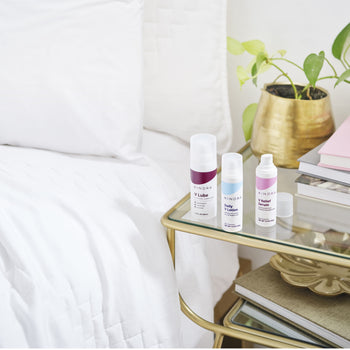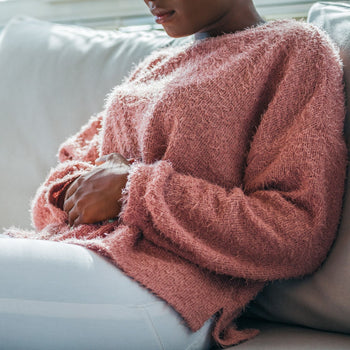This piece was written by Omisade Burney-Scott. Omisade Burney-Scott (she/her) is a social justice advocate, curator of stories, and the creator of The Black Girl’s Guide to Surviving Menopause—a space for exploration, mentorship, intimacy, and vulnerability around life, identity, and change.
There are a few things I remember about Mrs. Goldstein’s third grade class at Meadowbrook Elementary School in Bowie, Maryland.
I remember her coral lipstick that matched her coral fingernail polish (very 1976).
I remember her calling my name quite often in class because I was a “talker.”
More specifically, Tammy Young (not her real name) and I, the only two little Black girls in the class, were the talkers seated next to each other. Mrs. Goldstein would call my name only (not hers), which made me think she hated me.
She didn’t, but that’s what I told my mother. Mrs. Goldstein would reveal in a parent/teacher conference with my mom and forever protector that she thought I was one of the “smartest little girls she’s ever met,” but I was constantly being distracted from class work by hosting the “Tammy and Omi” show.
Looking back on it, I’m pretty sure Mrs. Goldstein was in her 40s and that some of her bursts of spontaneous fury – which were often matched by her enthusiastic pats on the back for jobs well done – could have been evidence of a woman in menopause teaching a class full of raucous nine year olds. At 55 I can’t confirm that, but I have a hunch.
I also remember loving our reader that taught us about reading comprehension. It was an oddly shaped book: rectangular, long, and thick and it held all the secrets to understanding a story aptly called “context clues.”. At the beginning of each entry, you would receive a list of clues that would help you identify the antagonist, protagonist, context, subtext, themes, plot twist, and conclusion. Each story in our reader began with the bread crumbs and at the end of the passage, we would often be asked “who is speaking in this story”?
I always loved that question and that exercise that gave me the opportunity to identify all the voices in the story. It’s a skill that’s aged well, in so many contexts beyond those beloved readers.
“I’m reaching out on behalf of Kindra. Kindra is a radical self-care company. And all that’s really radical about us is we see women over 50 as people. We make estrogen-free essentials, designed by women and for women, that support the menopause journey.”
— first contact with Kindra
In 2019, I launched the Black Girl’s Guide to Surviving Menopause, a multimedia project, focused on normalizing menopause and aging through the centering of the stories of Black women, women-identified and gender expansive people. We host and curate a podcast, intergenerational storytelling gatherings, and a zine titled “Messages from the Menopausal Multiverse.” I created BGG2SM for me, my mother, aunties, friends, and other Black people because there was, and to some degree still is, a void of spaces specifically focused on honoring our unique menopausal experiences and journey. Our goal is to engage in thoughtful narratives and advocacy work that spark a culture shift by intentionally creating spaces for our stories to be held and influence change.
My partnership with Kindra began in 2020 with a fairly standard sponsorship for our podcast. Seems like a very simple thing—pre-roll, mid-roll, a script, etc. However, I was instantly struck by the consistent respect and authentic way they engage and affirm Black Girl’s Guide’s approach to growing the menopausal landscape without invisibilizing marginalized communities and individuals – and that has only grown as we’ve continued to collaborate. We are not the same, but we are co-conspirators in our desire to offer menopausal people exquisite care. We hold a belief that all menopausal people deserve to be supported throughout their journey and that has led to a new collaboration that I am so very honored to have helped design.
The Say More discussion deck is an invitation. A beautifully-curated deck of discussion cards broken down into elemental categories—earth, wind, fire, and air. Each card explores themes like pleasure, grief, rage, play, creativity, idenity, sexual expression, and healing for those of us on our menopausal midlife journey.
The thing is, I thought about Mrs. Goldstein, those readers, and those context clues. The journey of menopause has its own context clues; it’s a unique experience for every person, but it doesn’t happen in a vacuum. There is also powerful connective tissue between us and the people we are in relationship with, our families, friends, jobs, communities, and society at large. It is a complex, dynamic, and intergenerational transformation that is not bound by gender, sexuality, age or race, but is influenced and impacted by larger societal notions and tropes.
Say More is like opening a familiar book years later, with a new perspective and beefed up context clues. Each element invites an individual or collective—friends, family, lovers, etc. to explore, consider, imagine and/or reimagine our menopausal/midlife experiences, notions, assumptions, aspirations, and visions. The deck offers a delicious plot twist! Menopause is not an ending, but a liminal pathway to the next iteration of yourself, n that liminal space you are not the only thing transformed; your relationships are, too. Co-designing this deck with the Kindra team was an exercise in applying my experience in social justice, utilizing dialogical tools like Paulo Freire’s Popular Education and Pedagogy of the Oppressed paired with my deep love for nature, astrology, oracle cards, and tarot.
The Say More deck is meant to be a deeply personal discussion tool for the individual that also opens a space and opportunity for deeper connections with those walking with us during this journey. A return to the question of “who is speaking in this story?” is shared with invitation, a gentle reminder tucked inside each element. It is also a proper reader for the next generation who will follow on their own path, inviting them to share their own emergent story.
This is a path purposefully illuminated by the Black Girl’s Guide, Kindra and so many more folks dedicated to normalizing menopause and aging for us all. Join us and Say More.
Continue the Conversation
Leave a Reply
Tags: Community mental health














What an interesting concept and I love the idea of sharing this journey with my village. Especially as I’ve been doing some work on reacquainting myself with this latest version.
— Marie B